(整理)伴随状语定义
伴随状语的用法
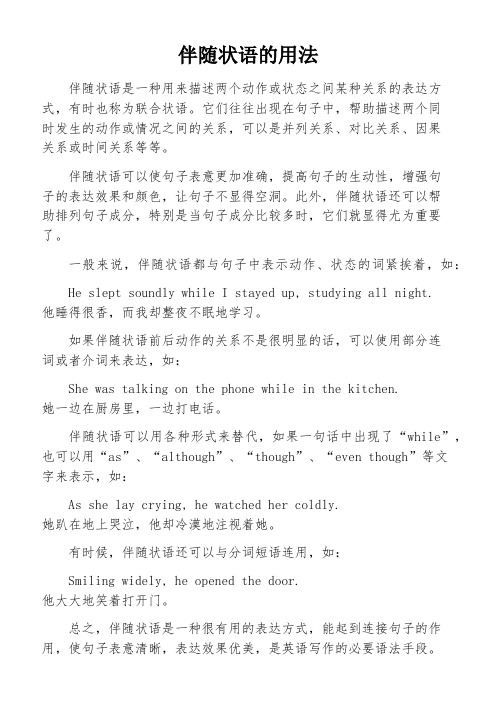
伴随状语的用法
伴随状语是一种用来描述两个动作或状态之间某种关系的表达方式,有时也称为联合状语。
它们往往出现在句子中,帮助描述两个同
时发生的动作或情况之间的关系,可以是并列关系、对比关系、因果
关系或时间关系等等。
伴随状语可以使句子表意更加准确,提高句子的生动性,增强句
子的表达效果和颜色,让句子不显得空洞。
此外,伴随状语还可以帮
助排列句子成分,特别是当句子成分比较多时,它们就显得尤为重要了。
一般来说,伴随状语都与句子中表示动作、状态的词紧挨着,如:
He slept soundly while I stayed up, studying all night.
他睡得很香,而我却整夜不眠地学习。
如果伴随状语前后动作的关系不是很明显的话,可以使用部分连
词或者介词来表达,如:
She was talking on the phone while in the kitchen.
她一边在厨房里,一边打电话。
伴随状语可以用各种形式来替代,如果一句话中出现了“while”,也可以用“as”、“although”、“though”、“even though”等文
字来表示,如:
As she lay crying, he watched her coldly.
她趴在地上哭泣,他却冷漠地注视着她。
有时候,伴随状语还可以与分词短语连用,如:
Smiling widely, he opened the door.
他大大地笑着打开门。
总之,伴随状语是一种很有用的表达方式,能起到连接句子的作用,使句子表意清晰,表达效果优美,是英语写作的必要语法手段。
伴随状语与状语从句的区别

伴随状语与状语从句的区别1.引言1.1 概述伴随状语和状语从句是语法学中常见的两个概念,它们在句子中的作用和表达方式存在一定的区别。
伴随状语是指用来表示主语动作或状态的同时发生的状况,而状语从句则是用来描述主句中的动作或状态的同时发生的情况。
伴随状语通常由介词短语或副词构成,放在主句中的谓语动词之后,用来修饰或说明主句中的动作或状态。
例如:“他边听音乐边写作业。
”这个句子中的“边听音乐边写作业”就是一个伴随状语,它使用了“边...边...”的结构来表示两个动作的同时发生。
而状语从句则是由一个引导词引导的从句,通常放在主句中的谓语动词之前,用来修饰整个句子的动作或状态。
例如:“当他听到好消息时,他高兴地笑了。
”这个句子中的“当他听到好消息时”就是一个状语从句,它通过引导词“当”来引导整个从句,用来描述主句中的动作“他高兴地笑了”的同时发生。
本文旨在比较和对比伴随状语与状语从句在结构、用法等方面的区别,并进一步探讨它们在句子中的作用和表达方式。
接下来将详细介绍伴随状语的定义和特点以及状语从句的定义和特点,通过对两者的对比,我们可以更好地理解它们的异同之处,并在实际应用中正确使用它们。
【1.2 文章结构】本篇文章将按照以下结构进行讨论:1. 引言1.1 概述1.2 文章结构1.3 目的2. 正文2.1 伴随状语的定义和特点2.2 状语从句的定义和特点3. 结论3.1 对比伴随状语与状语从句的区别3.2 总结在引言部分,我们将介绍本文所讨论的主题。
首先,我们会概述伴随状语和状语从句的概念和作用。
然后,我们将详细介绍文章的结构,以便读者能清晰地了解全文的组织和内容。
最后,我们会明确本文的目的,阐述为什么研究伴随状语和状语从句的区别是有意义的。
在正文部分,我们将分别探讨伴随状语和状语从句的定义和特点。
我们将详细解释伴随状语的概念,并探讨它在句子中的作用和用法。
随后,我们会对状语从句进行定义和解释,并讨论状语从句与其他句子成分的关系。
伴随状语的5种类型
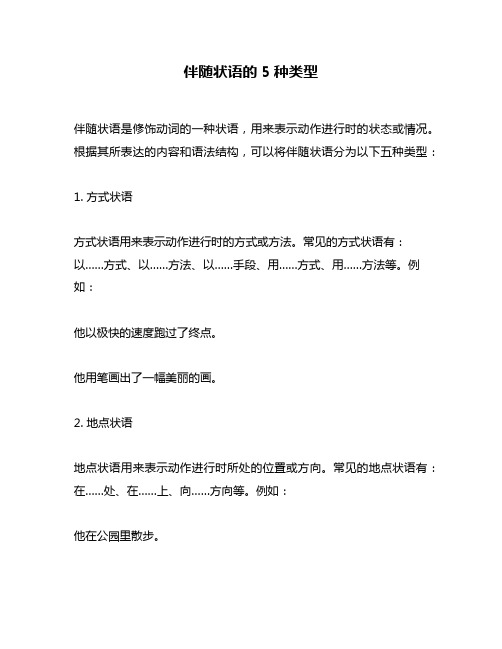
伴随状语的5种类型
伴随状语是修饰动词的一种状语,用来表示动作进行时的状态或情况。
根据其所表达的内容和语法结构,可以将伴随状语分为以下五种类型:
1. 方式状语
方式状语用来表示动作进行时的方式或方法。
常见的方式状语有:以……方式、以……方法、以……手段、用……方式、用……方法等。
例如:
他以极快的速度跑过了终点。
他用笔画出了一幅美丽的画。
2. 地点状语
地点状语用来表示动作进行时所处的位置或方向。
常见的地点状语有:在……处、在……上、向……方向等。
例如:
他在公园里散步。
他向东走去。
3. 时间状语
时间状语用来表示动作进行时所处的时间或持续时间。
常见的时间状语有:在……期间、在……时候、一边……一边等。
例如:
他一边吃早饭,一边看报纸。
她在假期期间去了海边玩。
4. 程度状语
程度状语用来表示动作进行时所达到的程度或强度。
常见的程度状语有:越来越……、更加……、十分……等。
例如:
他越来越喜欢跑步。
这个问题十分复杂。
5. 原因状语
原因状语用来表示动作进行时的原因或缘由。
常见的原因状语有:因
为……、由于……、出于……等。
例如:
他由于生病而缺席了会议。
出于好奇心,他去了那个地方。
总之,伴随状语是修饰动词的一种重要手段,能够使句子更加丰富多彩,表达更加准确。
不同类型的伴随状语在用法和意义上有所不同,需要根据具体情况选择合适的表达方式。
伴随状语的三种形式
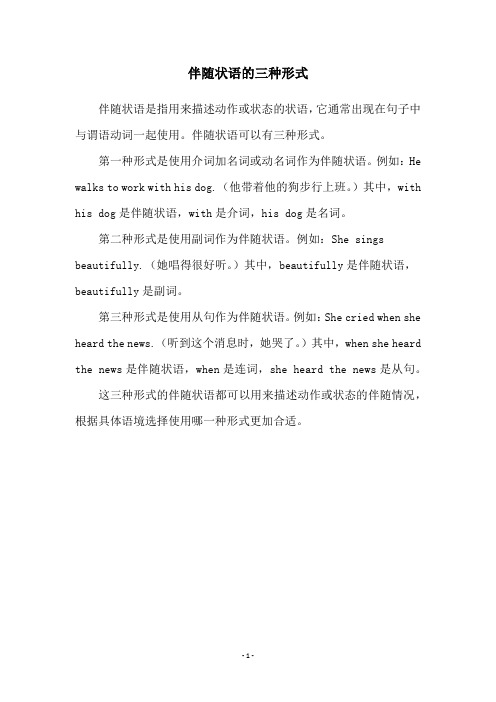
伴随状语的三种形式
伴随状语是指用来描述动作或状态的状语,它通常出现在句子中与谓语动词一起使用。
伴随状语可以有三种形式。
第一种形式是使用介词加名词或动名词作为伴随状语。
例如:He walks to work with his dog.(他带着他的狗步行上班。
)其中,with his dog是伴随状语,with是介词,his dog是名词。
第二种形式是使用副词作为伴随状语。
例如:She sings beautifully.(她唱得很好听。
)其中,beautifully是伴随状语,beautifully是副词。
第三种形式是使用从句作为伴随状语。
例如:She cried when she heard the news.(听到这个消息时,她哭了。
)其中,when she heard the news是伴随状语,when是连词,she heard the news是从句。
这三种形式的伴随状语都可以用来描述动作或状态的伴随情况,根据具体语境选择使用哪一种形式更加合适。
- 1 -。
伴随状语的用法介绍如何使用

伴随状语的用法介绍如何使用推荐文章如何使用时间状语从句热度:伴随状语的用法伴随状语如何判断热度:状语从句的用法如何使用状语从句热度:英语状语的用法英语状语如何使用热度:头饰的用法如何使用头饰热度:伴随状语是指状语从句的动作伴随主句发生,学习英语的小伙伴对伴随状语可能会有所了解,以下是由店铺整理关于伴随状语的用法的内容,希望大家喜欢!伴随状语的用法伴随状语的特点是:它所表达的动作或状态是伴随着句子谓语动词的动作而发生或存在的。
例如:①He sat in the armchair,reading a newspaper.他坐在扶手椅里读报。
②All night long he lay awake,thinking of the problem.他整夜躺在床上睡不着,思考着那个问题。
出现的条件是由一个主语发出两个动作或同一个主语处于两种状态,或同一个主语发出一个动作时又伴随有某一种状态。
伴随状语的逻辑主语一般情况下必须是全句的主语,伴随状语与谓语动词所表示的动作或状态是同时发生的。
一、使用分词形式The dog entered the room, following his master(这条狗跟着主人进了屋)。
The master entered the room,followed by his dog(主人进了屋,后面跟着他的狗)。
二、用with复合结构The little girls were playing with snow with their hands frozen red(小女孩们在玩雪,手都冻红了)。
三、用独立主格结构The little boy goes to school, the little dog accompanying him every day(这小孩每天去上学,那条小狗陪伴着他)。
四、用形容词Crusoe went home, full of fear(克鲁索满怀恐惧地回家)。
伴随 状语
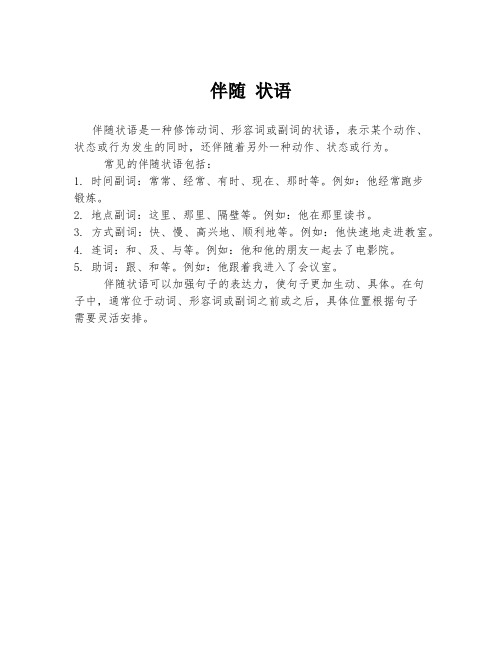
伴随状语
伴随状语是一种修饰动词、形容词或副词的状语,表示某个动作、状态或行为发生的同时,还伴随着另外一种动作、状态或行为。
常见的伴随状语包括:
1. 时间副词:常常、经常、有时、现在、那时等。
例如:他经常跑步
锻炼。
2. 地点副词:这里、那里、隔壁等。
例如:他在那里读书。
3. 方式副词:快、慢、高兴地、顺利地等。
例如:他快速地走进教室。
4. 连词:和、及、与等。
例如:他和他的朋友一起去了电影院。
5. 助词:跟、和等。
例如:他跟着我进入了会议室。
伴随状语可以加强句子的表达力,使句子更加生动、具体。
在句
子中,通常位于动词、形容词或副词之前或之后,具体位置根据句子
需要灵活安排。
英语语法专题-伴随状语、独立主格
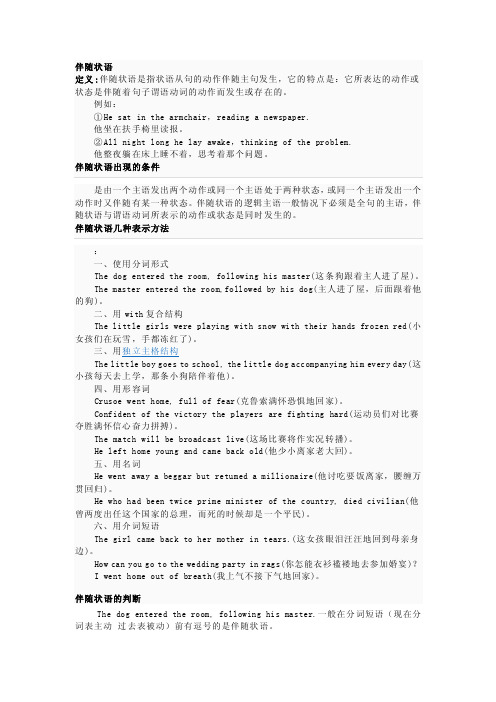
伴随状语定义:伴随状语是指状语从句的动作伴随主句发生,它的特点是:它所表达的动作或状态是伴随着句子谓语动词的动作而发生或存在的。
例如:①He sat in the armchair,reading a newspaper.他坐在扶手椅里读报。
②All night long he lay awake,thinking of the problem.他整夜躺在床上睡不着,思考着那个问题。
伴随状语出现的条件是由一个主语发出两个动作或同一个主语处于两种状态,或同一个主语发出一个动作时又伴随有某一种状态。
伴随状语的逻辑主语一般情况下必须是全句的主语,伴随状语与谓语动词所表示的动作或状态是同时发生的。
伴随状语几种表示方法:一、使用分词形式The dog entered the room, following his master(这条狗跟着主人进了屋)。
The master entered the room,followed by his dog(主人进了屋,后面跟着他的狗)。
二、用with复合结构The little girls were playing with snow with their hands frozen red(小女孩们在玩雪,手都冻红了)。
三、用独立主格结构The little boy goes to school, the little dog accompanying him every day(这小孩每天去上学,那条小狗陪伴着他)。
四、用形容词Crusoe went home, full of fear(克鲁索满怀恐惧地回家)。
Confident of the victory the players are fighting hard(运动员们对比赛夺胜满怀信心奋力拼搏)。
The match will be broadcast live(这场比赛将作实况转播)。
He left home young and came back old(他少小离家老大回)。
with sb doing sth伴随状语

with sb doing sth伴随状语【原创实用版】目录1.伴随状语的定义和作用2.伴随状语的常见类型3.伴随状语的语法特点4.伴随状语的实际应用正文一、伴随状语的定义和作用伴随状语,又称伴随状语从句,是用来修饰主句中的某个动词或形容词,表示该动词或形容词发生或存在时的伴随情况。
伴随状语在句子中起到补充说明的作用,使句子更加充实、具体。
二、伴随状语的常见类型伴随状语的类型有很多,以下是一些常见的伴随状语:1.时间状语:表示动作发生的时间,如:while (当我在做饭的时候)、as (当我正在吃饭时)。
2.地点状语:表示动作发生的地点,如:at the library (在图书馆)、in the park (在公园)。
3.方式状语:表示动作进行的方式,如:with (用)、in (以)、by (通过)。
4.原因状语:表示动作发生的原因,如:because (因为)、since (既然)。
5.结果状语:表示动作产生的结果,如:so (所以)、that (以至于)。
三、伴随状语的语法特点伴随状语从句通常由连词(如 while、as、at 等)引导,有时也可以由词组或副词引导。
伴随状语从句一般使用现在时态,即使主句使用的是过去时态。
此外,伴随状语从句中的主语通常是 it,而且通常省略。
四、伴随状语的实际应用伴随状语在英语中十分常见,掌握好伴随状语的使用对于提高英语写作和口语表达能力具有重要意义。
以下是一些实际应用的例子:1.While I was cooking dinner, she was watching TV.(当我在做饭的时候,她正在看电视。
)2.As he was walking to the store, he 遇到了 an old friend.(当他正在去商店的路上,他遇到了一个老朋友。
)3.With the help of my teacher, I passed the test.(在老师的帮助下,我通过了考试。
- 1、下载文档前请自行甄别文档内容的完整性,平台不提供额外的编辑、内容补充、找答案等附加服务。
- 2、"仅部分预览"的文档,不可在线预览部分如存在完整性等问题,可反馈申请退款(可完整预览的文档不适用该条件!)。
- 3、如文档侵犯您的权益,请联系客服反馈,我们会尽快为您处理(人工客服工作时间:9:00-18:30)。
定义
定义:伴随状语是指状语从句的动作伴随主句发生,它的特点是:它所表达的动作或状态是伴随着句子谓语动词的动作而发生或存在的。
例如:
①He sat in the armchair,reading a newspaper.
他坐在扶手椅里读报。
②All night long he lay awake,thinking of the problem.
他整夜躺在床上睡不着,思考着那个问题。
伴随状语出现的条件
是由一个主语发出两个动作或同一个主语处于两种状态,或同一个主语发出一个动作时又伴随有某一种状态。
伴随状语的逻辑主语一般情况下必须是全句的主语,伴随状语与谓语动词所表示的动作或状态是同时发生的。
伴随状语几种表示方法
一、使用分词形式
The dog entered the room, following his master(这条狗跟着主人进了屋)。
The master entered the room,followed by his dog(主人进了屋,后面跟着他的狗)。
二、用with复合结构
The little girls were playing with snow with their hands frozen red(小女孩们在玩雪,手都冻红了)。
三、用独立主格结构
The little boy goes to school, the little dog accompanying him every day(这小孩每天去上学,那条小狗陪伴着他)。
四、用形容词
Crusoe went home, full of fear(克鲁索满怀恐惧地回家)。
The match will be broadcast live(这场比赛将作实况转播)。
He left home young and came back old(他少小离家老大回)。
五、用名词
He went away a beggar but returned a millionaire(他讨吃要饭离家,腰缠万贯回归)。
六、用介词短语
The girl came back to her mother in tears.(这女孩眼泪汪汪地回到母亲身边)。
How can you go to the wedding party in rags(你怎能衣衫褴褛地去参加婚宴)?
I went home out of breath(我上气不接下气地回家)。
伴随状语的判断
The dog entered the room, following his master.一般在分词短语(现在分词表主动过去表被动)前有逗号的是伴随状语。
让步状语从句
使用的连词
引导让步状语从句的连词主要有以下这些:though, although, as; even if, even though; whether...or...; no matter+疑问词,疑问词-ever。
切记although不可与but连用。
用法
(1)though, although表示“虽然,纵然”之意,.用though/although, as 引导让步状语从句时,句中不能用but表示转折语气。
这两个连词意思大致相同,在一般情况下可以互换使用。
在口语中,though较常使用,although比though正式,二者都可与yet, still或never,the less连用,但不能与but连用。
例如:
Although/Though he was exhausted, (still) he kept on working. 虽然他已经精疲力竭了,但仍然继续工作。
Although/Though he is very old, (yet) he is quite strong. 他虽然年纪大了,身体还很健壮。
值得注意的是,although引导的让步状语从句位于主句之前的情况较多,though引导的让步状语从句可位于主句之前或主句之后。
例如:
She passed the examination though she had not studied very hard.
(2)as, though表示“虽然……但是”,“纵使……”之意。
as引导的让步状语从句必须以部分倒装的形式出现,被倒装的部分可以是表语、状语或动词原形,though也可用于这样的结构中,但although不可以这样用。
例如:
Object as you may, I’ll go.(=Though/Although you may object, I’ll go.) 纵使你反对,我也要去。
Hard as/ though he works, he makes little progress. (=Though he works hard, he makes little progress.)尽管他学习很努力,但几乎没取得什么进步
(3)even if, even though 表示“即使……”,“纵使……”之意,含有一种假设。
这两个复合连词的意思基本相同。
它们常互换使用,但意义有细微差别。
even if引导的让步从句含有强烈的假定性,可用来表示与事实相反的假设,但不能用来描述已经发生的事实。
而even though引导让步状语从句时,是以从句的内容为先决条件的,即说话人肯定了从句的事实,表示已经发生了的事。
例如:
We’ll make a trip even if/though the weather is bad.。
Even though/if he is poor, she loves him. (=He is poor, yet she loves him.)。
(4)whether...or...表示“不论是否……”,“不管是……还是……”之意。
由这一个复合连词引导的让步状语从句旨在说明正反两方面的可能性都不会影响主句
的意向或结果。
例如:You'll have to attend the ceremony whether you're free or busy.。
(5)“no matter+疑问词”或“疑问词-ever”的含义为“……都……;不管……都……”
当引导让步状语从句时,两者相同,可以互换,但当引导名词性从句(主语从句,宾语从句,表语从句和同位语从句)时则只能用whatever(whoever,whichever,whenever,etc)。
如上面最后两个例句可改为:
I want to marry the man I love, no matter who he may be.
下面句子不能用no matter结构(no matter不能引导名词性从句):
Whoever comes back first is supposed to win the prize.(主语从句)
I am ready to do whatever you want me to .(宾语从句)。
